Leadership in Healthcare: Reflective Practice and Action Plan
VerifiedAdded on 2023/06/09
|11
|2435
|128
AI Summary
This reflective piece discusses the importance of reflective practice in healthcare and the author's leadership traits. It also includes an action plan to develop feedback exchange and team building skills.
Contribute Materials
Your contribution can guide someone’s learning journey. Share your
documents today.
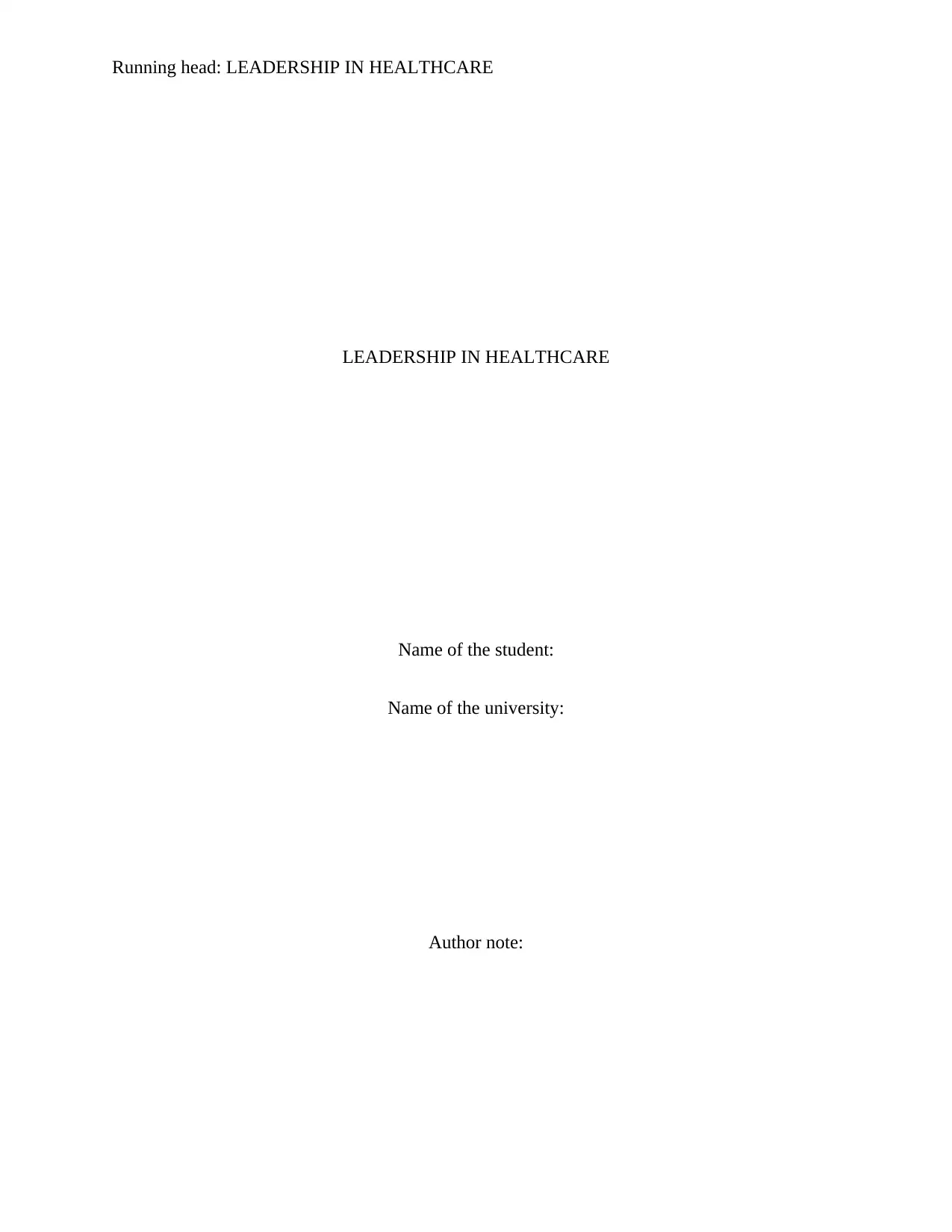
Running head: LEADERSHIP IN HEALTHCARE
LEADERSHIP IN HEALTHCARE
Name of the student:
Name of the university:
Author note:
LEADERSHIP IN HEALTHCARE
Name of the student:
Name of the university:
Author note:
Secure Best Marks with AI Grader
Need help grading? Try our AI Grader for instant feedback on your assignments.
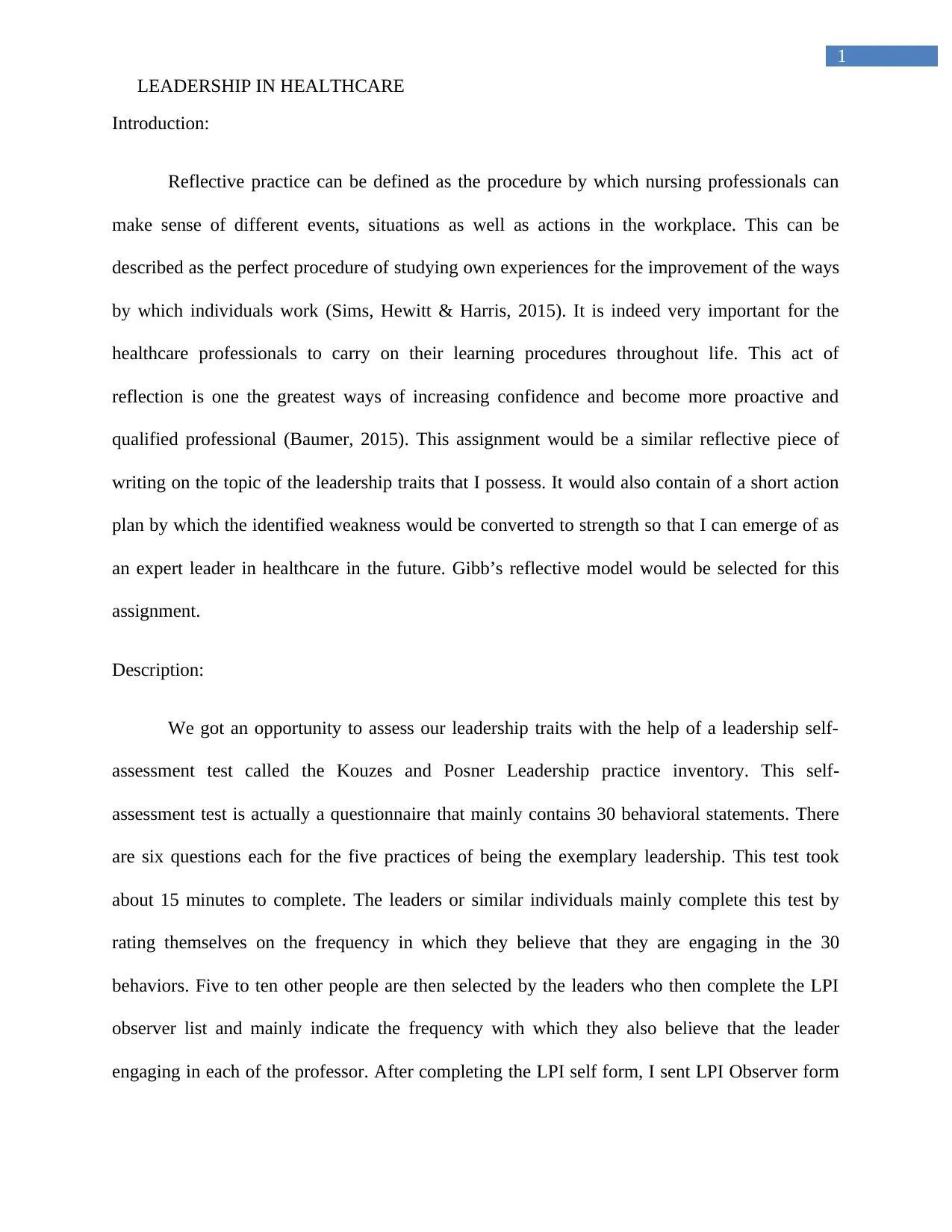
1
LEADERSHIP IN HEALTHCARE
Introduction:
Reflective practice can be defined as the procedure by which nursing professionals can
make sense of different events, situations as well as actions in the workplace. This can be
described as the perfect procedure of studying own experiences for the improvement of the ways
by which individuals work (Sims, Hewitt & Harris, 2015). It is indeed very important for the
healthcare professionals to carry on their learning procedures throughout life. This act of
reflection is one the greatest ways of increasing confidence and become more proactive and
qualified professional (Baumer, 2015). This assignment would be a similar reflective piece of
writing on the topic of the leadership traits that I possess. It would also contain of a short action
plan by which the identified weakness would be converted to strength so that I can emerge of as
an expert leader in healthcare in the future. Gibb’s reflective model would be selected for this
assignment.
Description:
We got an opportunity to assess our leadership traits with the help of a leadership self-
assessment test called the Kouzes and Posner Leadership practice inventory. This self-
assessment test is actually a questionnaire that mainly contains 30 behavioral statements. There
are six questions each for the five practices of being the exemplary leadership. This test took
about 15 minutes to complete. The leaders or similar individuals mainly complete this test by
rating themselves on the frequency in which they believe that they are engaging in the 30
behaviors. Five to ten other people are then selected by the leaders who then complete the LPI
observer list and mainly indicate the frequency with which they also believe that the leader
engaging in each of the professor. After completing the LPI self form, I sent LPI Observer form
LEADERSHIP IN HEALTHCARE
Introduction:
Reflective practice can be defined as the procedure by which nursing professionals can
make sense of different events, situations as well as actions in the workplace. This can be
described as the perfect procedure of studying own experiences for the improvement of the ways
by which individuals work (Sims, Hewitt & Harris, 2015). It is indeed very important for the
healthcare professionals to carry on their learning procedures throughout life. This act of
reflection is one the greatest ways of increasing confidence and become more proactive and
qualified professional (Baumer, 2015). This assignment would be a similar reflective piece of
writing on the topic of the leadership traits that I possess. It would also contain of a short action
plan by which the identified weakness would be converted to strength so that I can emerge of as
an expert leader in healthcare in the future. Gibb’s reflective model would be selected for this
assignment.
Description:
We got an opportunity to assess our leadership traits with the help of a leadership self-
assessment test called the Kouzes and Posner Leadership practice inventory. This self-
assessment test is actually a questionnaire that mainly contains 30 behavioral statements. There
are six questions each for the five practices of being the exemplary leadership. This test took
about 15 minutes to complete. The leaders or similar individuals mainly complete this test by
rating themselves on the frequency in which they believe that they are engaging in the 30
behaviors. Five to ten other people are then selected by the leaders who then complete the LPI
observer list and mainly indicate the frequency with which they also believe that the leader
engaging in each of the professor. After completing the LPI self form, I sent LPI Observer form
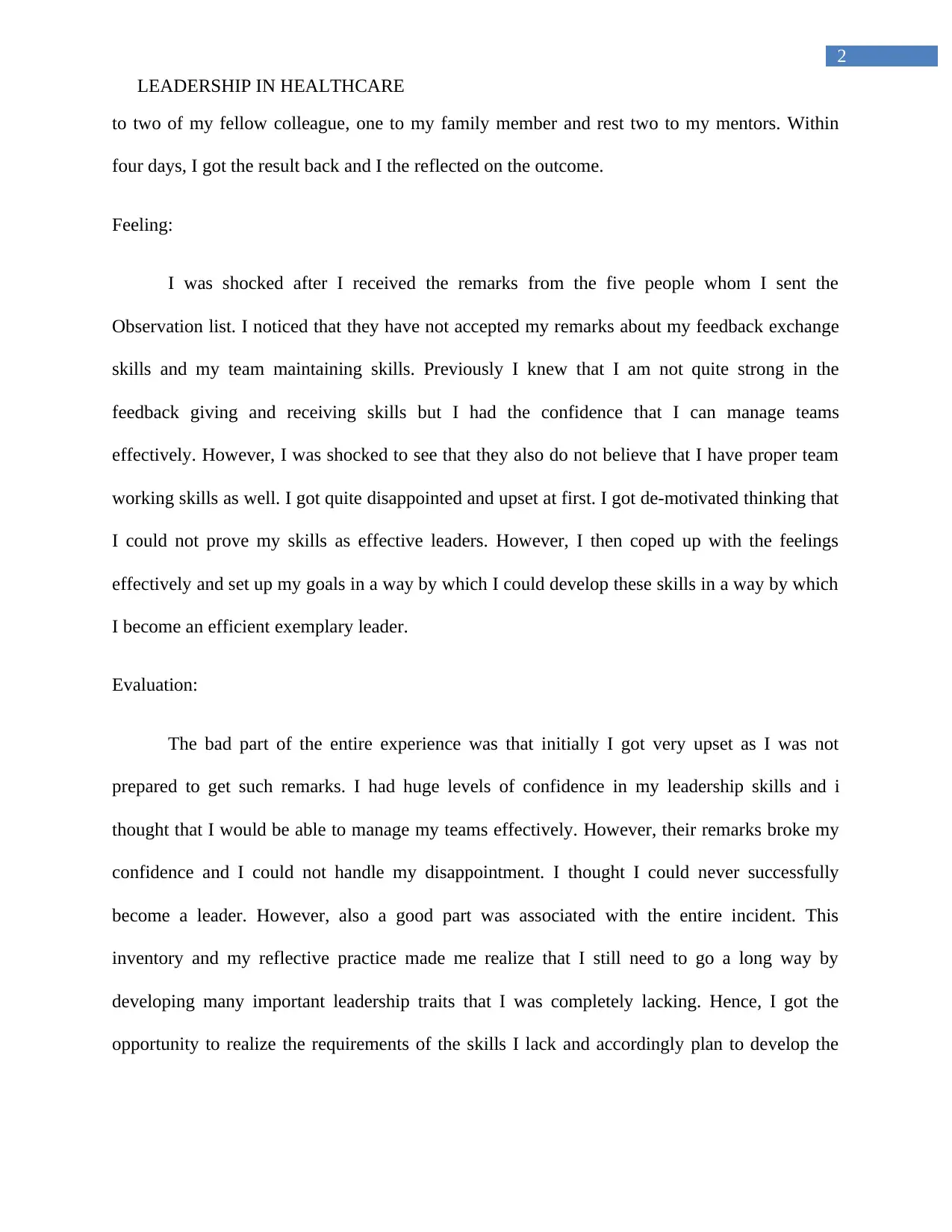
2
LEADERSHIP IN HEALTHCARE
to two of my fellow colleague, one to my family member and rest two to my mentors. Within
four days, I got the result back and I the reflected on the outcome.
Feeling:
I was shocked after I received the remarks from the five people whom I sent the
Observation list. I noticed that they have not accepted my remarks about my feedback exchange
skills and my team maintaining skills. Previously I knew that I am not quite strong in the
feedback giving and receiving skills but I had the confidence that I can manage teams
effectively. However, I was shocked to see that they also do not believe that I have proper team
working skills as well. I got quite disappointed and upset at first. I got de-motivated thinking that
I could not prove my skills as effective leaders. However, I then coped up with the feelings
effectively and set up my goals in a way by which I could develop these skills in a way by which
I become an efficient exemplary leader.
Evaluation:
The bad part of the entire experience was that initially I got very upset as I was not
prepared to get such remarks. I had huge levels of confidence in my leadership skills and i
thought that I would be able to manage my teams effectively. However, their remarks broke my
confidence and I could not handle my disappointment. I thought I could never successfully
become a leader. However, also a good part was associated with the entire incident. This
inventory and my reflective practice made me realize that I still need to go a long way by
developing many important leadership traits that I was completely lacking. Hence, I got the
opportunity to realize the requirements of the skills I lack and accordingly plan to develop the
LEADERSHIP IN HEALTHCARE
to two of my fellow colleague, one to my family member and rest two to my mentors. Within
four days, I got the result back and I the reflected on the outcome.
Feeling:
I was shocked after I received the remarks from the five people whom I sent the
Observation list. I noticed that they have not accepted my remarks about my feedback exchange
skills and my team maintaining skills. Previously I knew that I am not quite strong in the
feedback giving and receiving skills but I had the confidence that I can manage teams
effectively. However, I was shocked to see that they also do not believe that I have proper team
working skills as well. I got quite disappointed and upset at first. I got de-motivated thinking that
I could not prove my skills as effective leaders. However, I then coped up with the feelings
effectively and set up my goals in a way by which I could develop these skills in a way by which
I become an efficient exemplary leader.
Evaluation:
The bad part of the entire experience was that initially I got very upset as I was not
prepared to get such remarks. I had huge levels of confidence in my leadership skills and i
thought that I would be able to manage my teams effectively. However, their remarks broke my
confidence and I could not handle my disappointment. I thought I could never successfully
become a leader. However, also a good part was associated with the entire incident. This
inventory and my reflective practice made me realize that I still need to go a long way by
developing many important leadership traits that I was completely lacking. Hence, I got the
opportunity to realize the requirements of the skills I lack and accordingly plan to develop the
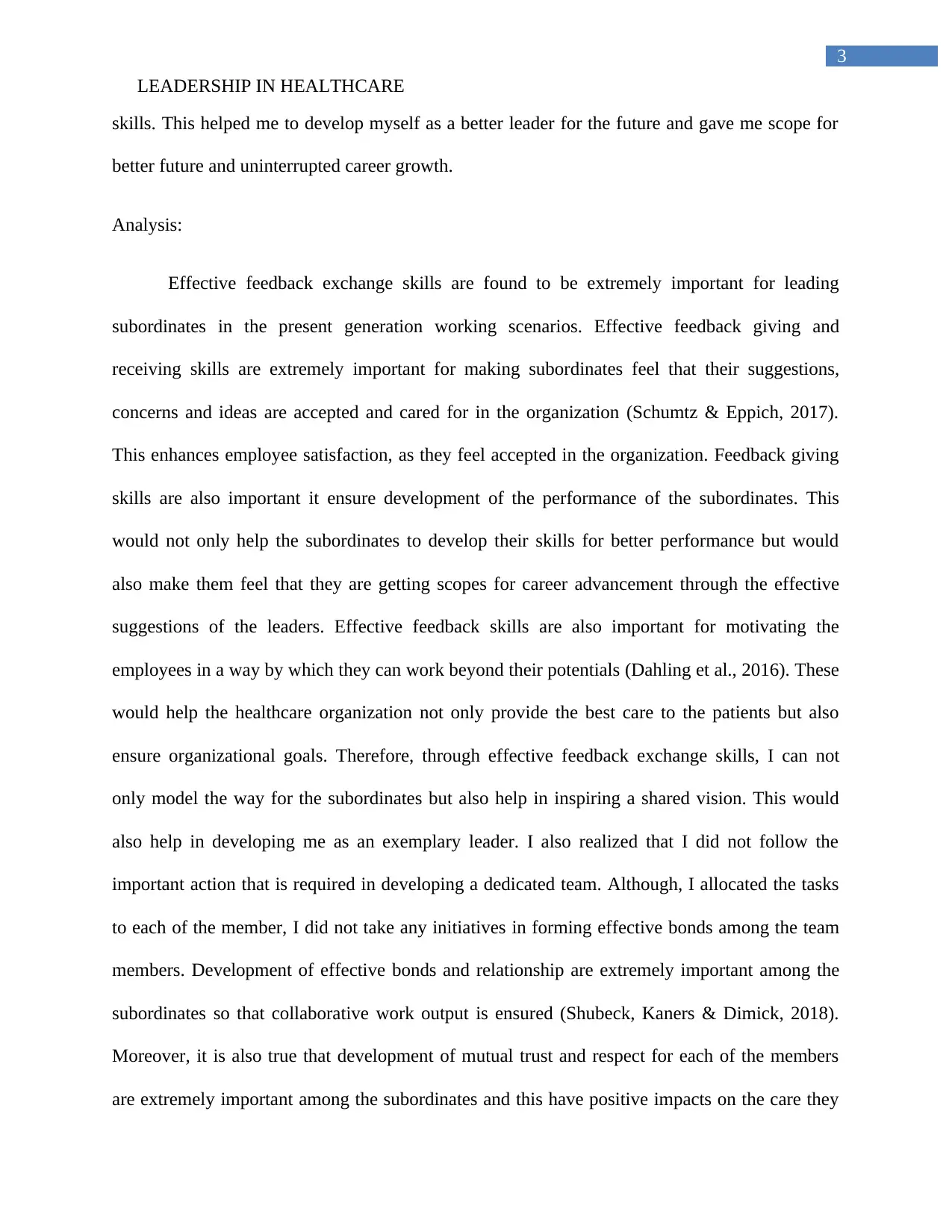
3
LEADERSHIP IN HEALTHCARE
skills. This helped me to develop myself as a better leader for the future and gave me scope for
better future and uninterrupted career growth.
Analysis:
Effective feedback exchange skills are found to be extremely important for leading
subordinates in the present generation working scenarios. Effective feedback giving and
receiving skills are extremely important for making subordinates feel that their suggestions,
concerns and ideas are accepted and cared for in the organization (Schumtz & Eppich, 2017).
This enhances employee satisfaction, as they feel accepted in the organization. Feedback giving
skills are also important it ensure development of the performance of the subordinates. This
would not only help the subordinates to develop their skills for better performance but would
also make them feel that they are getting scopes for career advancement through the effective
suggestions of the leaders. Effective feedback skills are also important for motivating the
employees in a way by which they can work beyond their potentials (Dahling et al., 2016). These
would help the healthcare organization not only provide the best care to the patients but also
ensure organizational goals. Therefore, through effective feedback exchange skills, I can not
only model the way for the subordinates but also help in inspiring a shared vision. This would
also help in developing me as an exemplary leader. I also realized that I did not follow the
important action that is required in developing a dedicated team. Although, I allocated the tasks
to each of the member, I did not take any initiatives in forming effective bonds among the team
members. Development of effective bonds and relationship are extremely important among the
subordinates so that collaborative work output is ensured (Shubeck, Kaners & Dimick, 2018).
Moreover, it is also true that development of mutual trust and respect for each of the members
are extremely important among the subordinates and this have positive impacts on the care they
LEADERSHIP IN HEALTHCARE
skills. This helped me to develop myself as a better leader for the future and gave me scope for
better future and uninterrupted career growth.
Analysis:
Effective feedback exchange skills are found to be extremely important for leading
subordinates in the present generation working scenarios. Effective feedback giving and
receiving skills are extremely important for making subordinates feel that their suggestions,
concerns and ideas are accepted and cared for in the organization (Schumtz & Eppich, 2017).
This enhances employee satisfaction, as they feel accepted in the organization. Feedback giving
skills are also important it ensure development of the performance of the subordinates. This
would not only help the subordinates to develop their skills for better performance but would
also make them feel that they are getting scopes for career advancement through the effective
suggestions of the leaders. Effective feedback skills are also important for motivating the
employees in a way by which they can work beyond their potentials (Dahling et al., 2016). These
would help the healthcare organization not only provide the best care to the patients but also
ensure organizational goals. Therefore, through effective feedback exchange skills, I can not
only model the way for the subordinates but also help in inspiring a shared vision. This would
also help in developing me as an exemplary leader. I also realized that I did not follow the
important action that is required in developing a dedicated team. Although, I allocated the tasks
to each of the member, I did not take any initiatives in forming effective bonds among the team
members. Development of effective bonds and relationship are extremely important among the
subordinates so that collaborative work output is ensured (Shubeck, Kaners & Dimick, 2018).
Moreover, it is also true that development of mutual trust and respect for each of the members
are extremely important among the subordinates and this have positive impacts on the care they
Secure Best Marks with AI Grader
Need help grading? Try our AI Grader for instant feedback on your assignments.
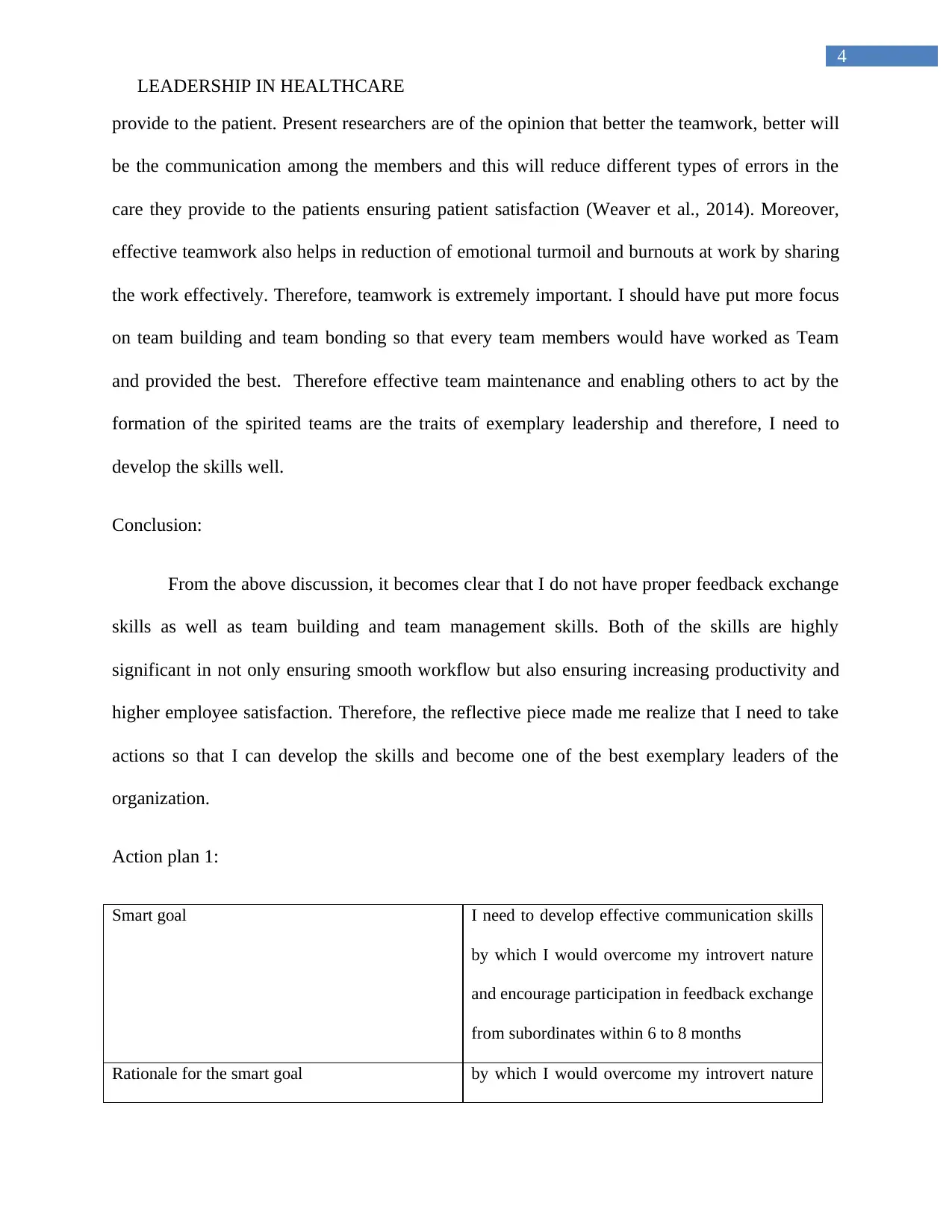
4
LEADERSHIP IN HEALTHCARE
provide to the patient. Present researchers are of the opinion that better the teamwork, better will
be the communication among the members and this will reduce different types of errors in the
care they provide to the patients ensuring patient satisfaction (Weaver et al., 2014). Moreover,
effective teamwork also helps in reduction of emotional turmoil and burnouts at work by sharing
the work effectively. Therefore, teamwork is extremely important. I should have put more focus
on team building and team bonding so that every team members would have worked as Team
and provided the best. Therefore effective team maintenance and enabling others to act by the
formation of the spirited teams are the traits of exemplary leadership and therefore, I need to
develop the skills well.
Conclusion:
From the above discussion, it becomes clear that I do not have proper feedback exchange
skills as well as team building and team management skills. Both of the skills are highly
significant in not only ensuring smooth workflow but also ensuring increasing productivity and
higher employee satisfaction. Therefore, the reflective piece made me realize that I need to take
actions so that I can develop the skills and become one of the best exemplary leaders of the
organization.
Action plan 1:
Smart goal I need to develop effective communication skills
by which I would overcome my introvert nature
and encourage participation in feedback exchange
from subordinates within 6 to 8 months
Rationale for the smart goal by which I would overcome my introvert nature
LEADERSHIP IN HEALTHCARE
provide to the patient. Present researchers are of the opinion that better the teamwork, better will
be the communication among the members and this will reduce different types of errors in the
care they provide to the patients ensuring patient satisfaction (Weaver et al., 2014). Moreover,
effective teamwork also helps in reduction of emotional turmoil and burnouts at work by sharing
the work effectively. Therefore, teamwork is extremely important. I should have put more focus
on team building and team bonding so that every team members would have worked as Team
and provided the best. Therefore effective team maintenance and enabling others to act by the
formation of the spirited teams are the traits of exemplary leadership and therefore, I need to
develop the skills well.
Conclusion:
From the above discussion, it becomes clear that I do not have proper feedback exchange
skills as well as team building and team management skills. Both of the skills are highly
significant in not only ensuring smooth workflow but also ensuring increasing productivity and
higher employee satisfaction. Therefore, the reflective piece made me realize that I need to take
actions so that I can develop the skills and become one of the best exemplary leaders of the
organization.
Action plan 1:
Smart goal I need to develop effective communication skills
by which I would overcome my introvert nature
and encourage participation in feedback exchange
from subordinates within 6 to 8 months
Rationale for the smart goal by which I would overcome my introvert nature
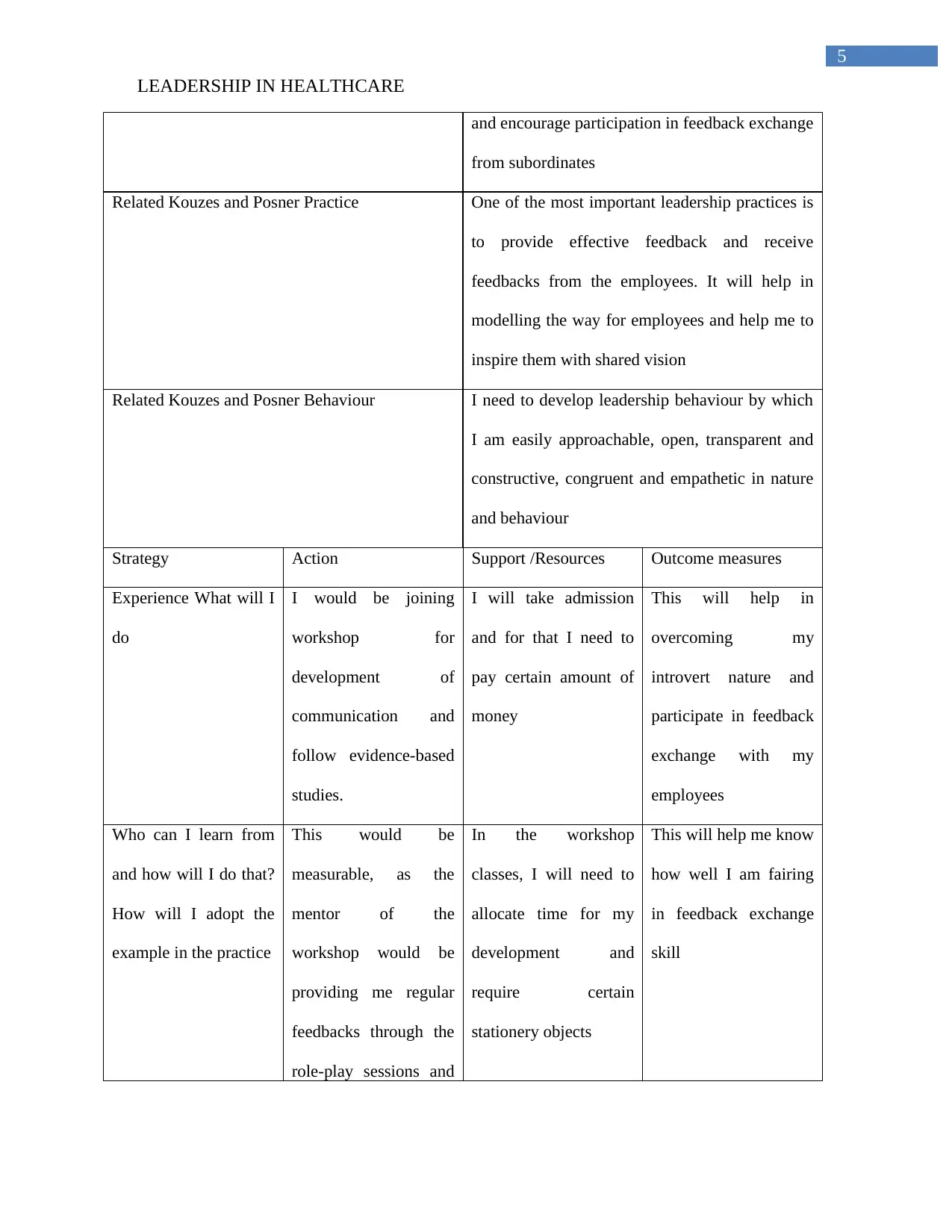
5
LEADERSHIP IN HEALTHCARE
and encourage participation in feedback exchange
from subordinates
Related Kouzes and Posner Practice One of the most important leadership practices is
to provide effective feedback and receive
feedbacks from the employees. It will help in
modelling the way for employees and help me to
inspire them with shared vision
Related Kouzes and Posner Behaviour I need to develop leadership behaviour by which
I am easily approachable, open, transparent and
constructive, congruent and empathetic in nature
and behaviour
Strategy Action Support /Resources Outcome measures
Experience What will I
do
I would be joining
workshop for
development of
communication and
follow evidence-based
studies.
I will take admission
and for that I need to
pay certain amount of
money
This will help in
overcoming my
introvert nature and
participate in feedback
exchange with my
employees
Who can I learn from
and how will I do that?
How will I adopt the
example in the practice
This would be
measurable, as the
mentor of the
workshop would be
providing me regular
feedbacks through the
role-play sessions and
In the workshop
classes, I will need to
allocate time for my
development and
require certain
stationery objects
This will help me know
how well I am fairing
in feedback exchange
skill
LEADERSHIP IN HEALTHCARE
and encourage participation in feedback exchange
from subordinates
Related Kouzes and Posner Practice One of the most important leadership practices is
to provide effective feedback and receive
feedbacks from the employees. It will help in
modelling the way for employees and help me to
inspire them with shared vision
Related Kouzes and Posner Behaviour I need to develop leadership behaviour by which
I am easily approachable, open, transparent and
constructive, congruent and empathetic in nature
and behaviour
Strategy Action Support /Resources Outcome measures
Experience What will I
do
I would be joining
workshop for
development of
communication and
follow evidence-based
studies.
I will take admission
and for that I need to
pay certain amount of
money
This will help in
overcoming my
introvert nature and
participate in feedback
exchange with my
employees
Who can I learn from
and how will I do that?
How will I adopt the
example in the practice
This would be
measurable, as the
mentor of the
workshop would be
providing me regular
feedbacks through the
role-play sessions and
In the workshop
classes, I will need to
allocate time for my
development and
require certain
stationery objects
This will help me know
how well I am fairing
in feedback exchange
skill
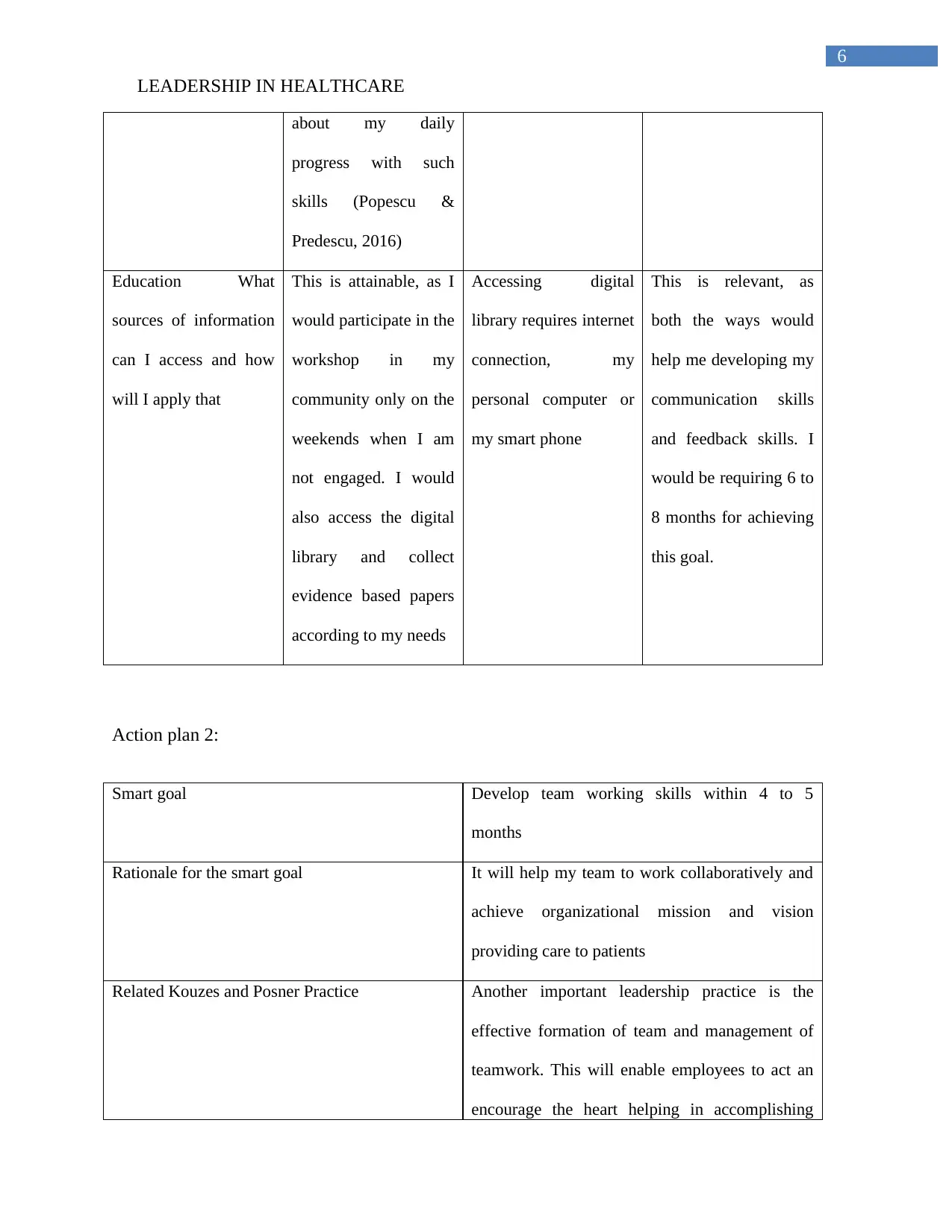
6
LEADERSHIP IN HEALTHCARE
about my daily
progress with such
skills (Popescu &
Predescu, 2016)
Education What
sources of information
can I access and how
will I apply that
This is attainable, as I
would participate in the
workshop in my
community only on the
weekends when I am
not engaged. I would
also access the digital
library and collect
evidence based papers
according to my needs
Accessing digital
library requires internet
connection, my
personal computer or
my smart phone
This is relevant, as
both the ways would
help me developing my
communication skills
and feedback skills. I
would be requiring 6 to
8 months for achieving
this goal.
Action plan 2:
Smart goal Develop team working skills within 4 to 5
months
Rationale for the smart goal It will help my team to work collaboratively and
achieve organizational mission and vision
providing care to patients
Related Kouzes and Posner Practice Another important leadership practice is the
effective formation of team and management of
teamwork. This will enable employees to act an
encourage the heart helping in accomplishing
LEADERSHIP IN HEALTHCARE
about my daily
progress with such
skills (Popescu &
Predescu, 2016)
Education What
sources of information
can I access and how
will I apply that
This is attainable, as I
would participate in the
workshop in my
community only on the
weekends when I am
not engaged. I would
also access the digital
library and collect
evidence based papers
according to my needs
Accessing digital
library requires internet
connection, my
personal computer or
my smart phone
This is relevant, as
both the ways would
help me developing my
communication skills
and feedback skills. I
would be requiring 6 to
8 months for achieving
this goal.
Action plan 2:
Smart goal Develop team working skills within 4 to 5
months
Rationale for the smart goal It will help my team to work collaboratively and
achieve organizational mission and vision
providing care to patients
Related Kouzes and Posner Practice Another important leadership practice is the
effective formation of team and management of
teamwork. This will enable employees to act an
encourage the heart helping in accomplishing
Paraphrase This Document
Need a fresh take? Get an instant paraphrase of this document with our AI Paraphraser
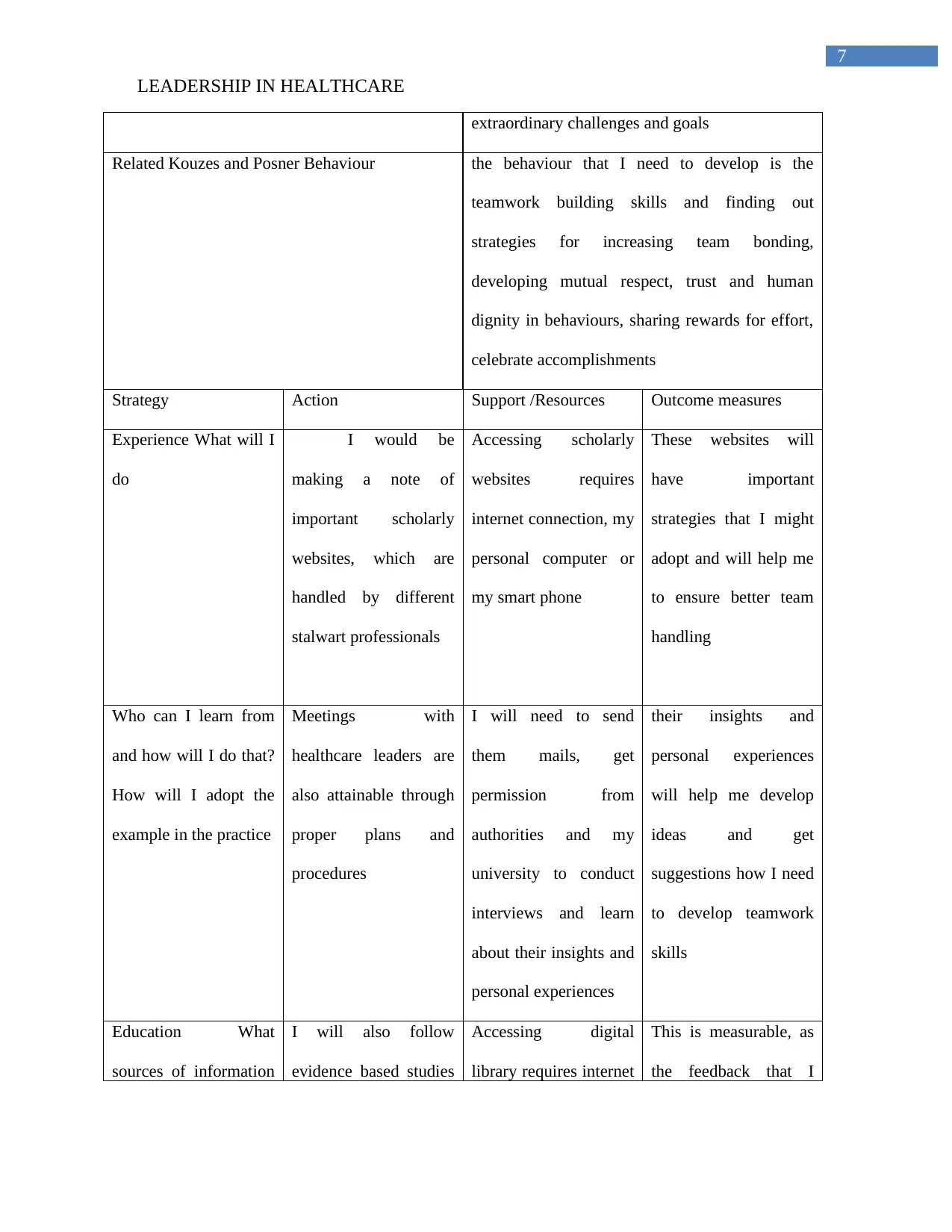
7
LEADERSHIP IN HEALTHCARE
extraordinary challenges and goals
Related Kouzes and Posner Behaviour the behaviour that I need to develop is the
teamwork building skills and finding out
strategies for increasing team bonding,
developing mutual respect, trust and human
dignity in behaviours, sharing rewards for effort,
celebrate accomplishments
Strategy Action Support /Resources Outcome measures
Experience What will I
do
I would be
making a note of
important scholarly
websites, which are
handled by different
stalwart professionals
Accessing scholarly
websites requires
internet connection, my
personal computer or
my smart phone
These websites will
have important
strategies that I might
adopt and will help me
to ensure better team
handling
Who can I learn from
and how will I do that?
How will I adopt the
example in the practice
Meetings with
healthcare leaders are
also attainable through
proper plans and
procedures
I will need to send
them mails, get
permission from
authorities and my
university to conduct
interviews and learn
about their insights and
personal experiences
their insights and
personal experiences
will help me develop
ideas and get
suggestions how I need
to develop teamwork
skills
Education What
sources of information
I will also follow
evidence based studies
Accessing digital
library requires internet
This is measurable, as
the feedback that I
LEADERSHIP IN HEALTHCARE
extraordinary challenges and goals
Related Kouzes and Posner Behaviour the behaviour that I need to develop is the
teamwork building skills and finding out
strategies for increasing team bonding,
developing mutual respect, trust and human
dignity in behaviours, sharing rewards for effort,
celebrate accomplishments
Strategy Action Support /Resources Outcome measures
Experience What will I
do
I would be
making a note of
important scholarly
websites, which are
handled by different
stalwart professionals
Accessing scholarly
websites requires
internet connection, my
personal computer or
my smart phone
These websites will
have important
strategies that I might
adopt and will help me
to ensure better team
handling
Who can I learn from
and how will I do that?
How will I adopt the
example in the practice
Meetings with
healthcare leaders are
also attainable through
proper plans and
procedures
I will need to send
them mails, get
permission from
authorities and my
university to conduct
interviews and learn
about their insights and
personal experiences
their insights and
personal experiences
will help me develop
ideas and get
suggestions how I need
to develop teamwork
skills
Education What
sources of information
I will also follow
evidence based studies
Accessing digital
library requires internet
This is measurable, as
the feedback that I
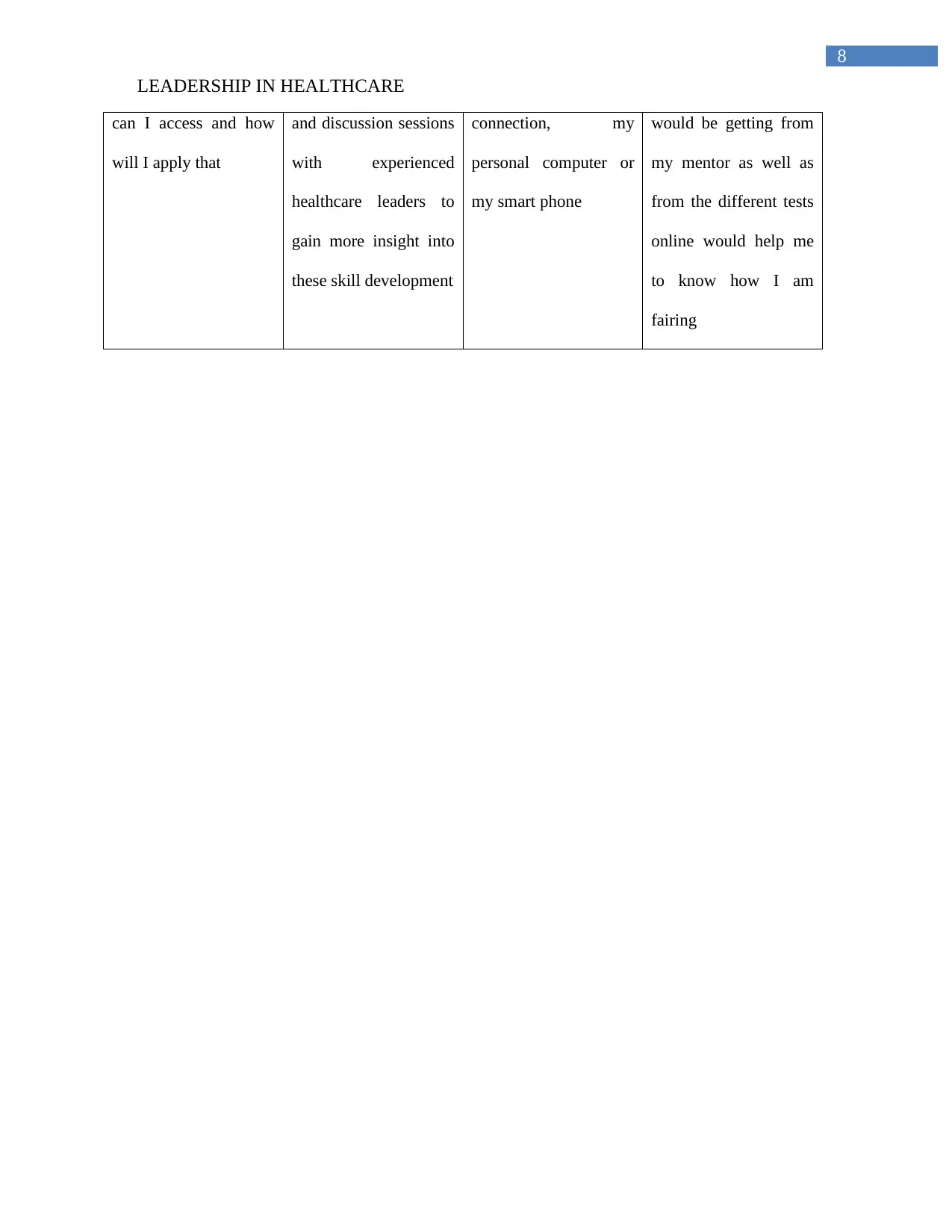
8
LEADERSHIP IN HEALTHCARE
can I access and how
will I apply that
and discussion sessions
with experienced
healthcare leaders to
gain more insight into
these skill development
connection, my
personal computer or
my smart phone
would be getting from
my mentor as well as
from the different tests
online would help me
to know how I am
fairing
LEADERSHIP IN HEALTHCARE
can I access and how
will I apply that
and discussion sessions
with experienced
healthcare leaders to
gain more insight into
these skill development
connection, my
personal computer or
my smart phone
would be getting from
my mentor as well as
from the different tests
online would help me
to know how I am
fairing
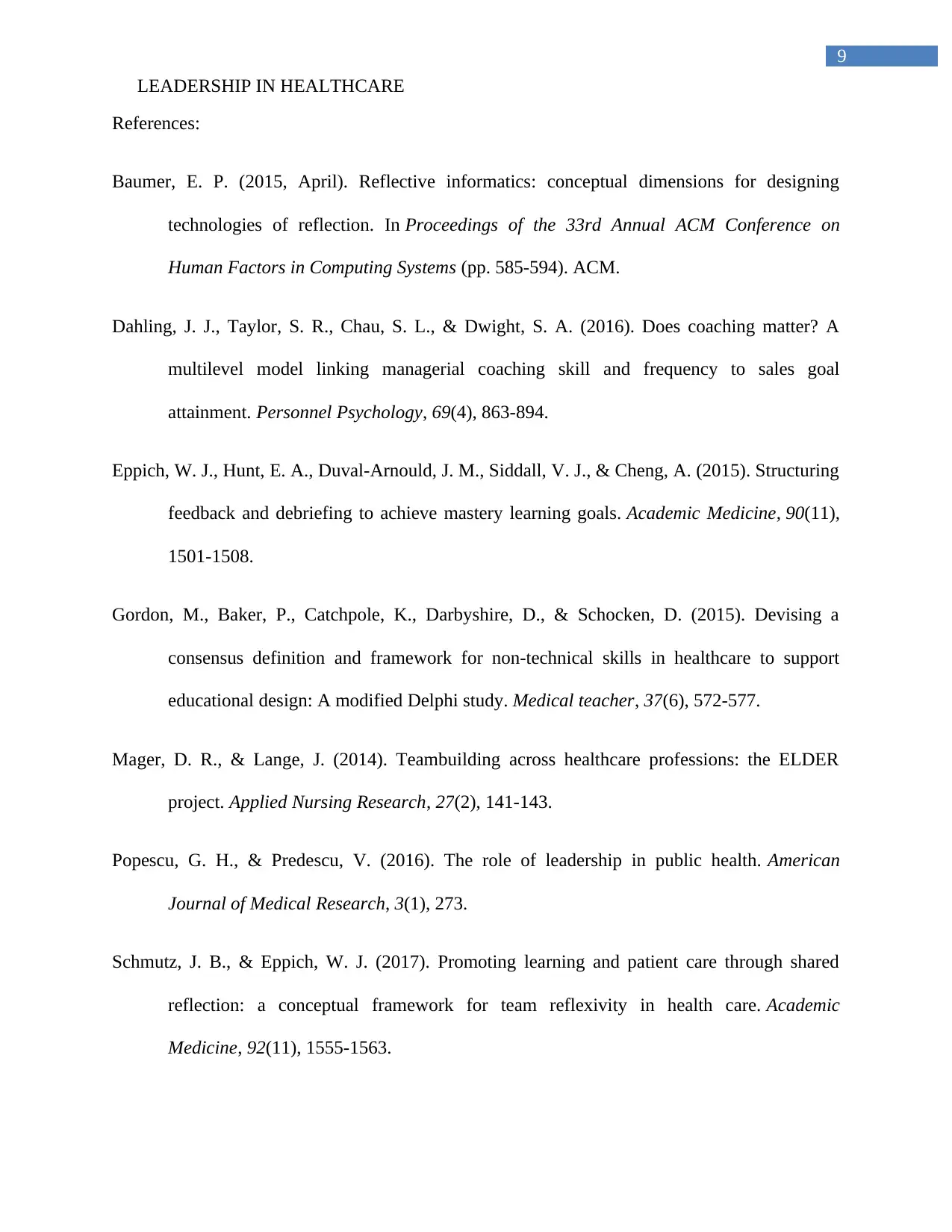
9
LEADERSHIP IN HEALTHCARE
References:
Baumer, E. P. (2015, April). Reflective informatics: conceptual dimensions for designing
technologies of reflection. In Proceedings of the 33rd Annual ACM Conference on
Human Factors in Computing Systems (pp. 585-594). ACM.
Dahling, J. J., Taylor, S. R., Chau, S. L., & Dwight, S. A. (2016). Does coaching matter? A
multilevel model linking managerial coaching skill and frequency to sales goal
attainment. Personnel Psychology, 69(4), 863-894.
Eppich, W. J., Hunt, E. A., Duval-Arnould, J. M., Siddall, V. J., & Cheng, A. (2015). Structuring
feedback and debriefing to achieve mastery learning goals. Academic Medicine, 90(11),
1501-1508.
Gordon, M., Baker, P., Catchpole, K., Darbyshire, D., & Schocken, D. (2015). Devising a
consensus definition and framework for non-technical skills in healthcare to support
educational design: A modified Delphi study. Medical teacher, 37(6), 572-577.
Mager, D. R., & Lange, J. (2014). Teambuilding across healthcare professions: the ELDER
project. Applied Nursing Research, 27(2), 141-143.
Popescu, G. H., & Predescu, V. (2016). The role of leadership in public health. American
Journal of Medical Research, 3(1), 273.
Schmutz, J. B., & Eppich, W. J. (2017). Promoting learning and patient care through shared
reflection: a conceptual framework for team reflexivity in health care. Academic
Medicine, 92(11), 1555-1563.
LEADERSHIP IN HEALTHCARE
References:
Baumer, E. P. (2015, April). Reflective informatics: conceptual dimensions for designing
technologies of reflection. In Proceedings of the 33rd Annual ACM Conference on
Human Factors in Computing Systems (pp. 585-594). ACM.
Dahling, J. J., Taylor, S. R., Chau, S. L., & Dwight, S. A. (2016). Does coaching matter? A
multilevel model linking managerial coaching skill and frequency to sales goal
attainment. Personnel Psychology, 69(4), 863-894.
Eppich, W. J., Hunt, E. A., Duval-Arnould, J. M., Siddall, V. J., & Cheng, A. (2015). Structuring
feedback and debriefing to achieve mastery learning goals. Academic Medicine, 90(11),
1501-1508.
Gordon, M., Baker, P., Catchpole, K., Darbyshire, D., & Schocken, D. (2015). Devising a
consensus definition and framework for non-technical skills in healthcare to support
educational design: A modified Delphi study. Medical teacher, 37(6), 572-577.
Mager, D. R., & Lange, J. (2014). Teambuilding across healthcare professions: the ELDER
project. Applied Nursing Research, 27(2), 141-143.
Popescu, G. H., & Predescu, V. (2016). The role of leadership in public health. American
Journal of Medical Research, 3(1), 273.
Schmutz, J. B., & Eppich, W. J. (2017). Promoting learning and patient care through shared
reflection: a conceptual framework for team reflexivity in health care. Academic
Medicine, 92(11), 1555-1563.
Secure Best Marks with AI Grader
Need help grading? Try our AI Grader for instant feedback on your assignments.
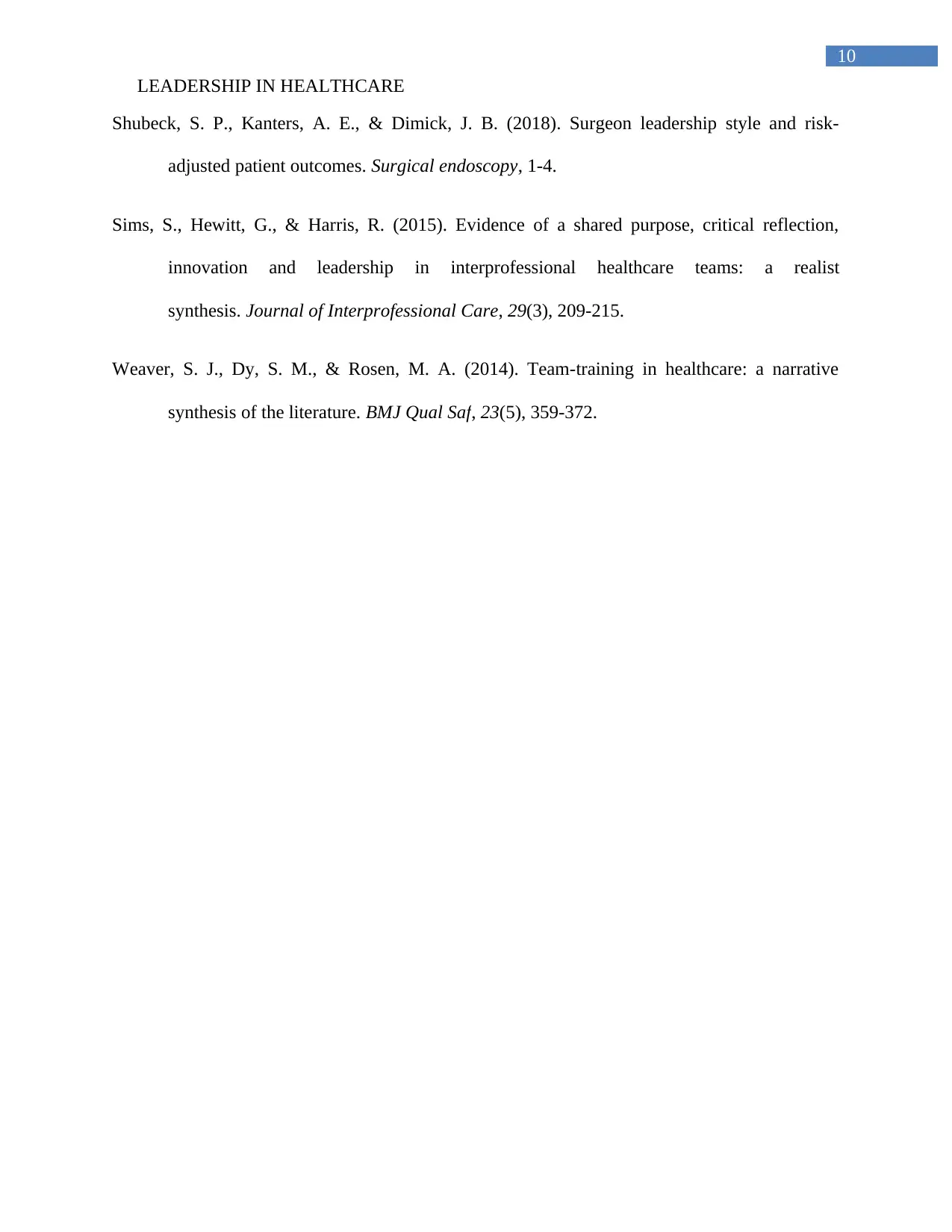
10
LEADERSHIP IN HEALTHCARE
Shubeck, S. P., Kanters, A. E., & Dimick, J. B. (2018). Surgeon leadership style and risk-
adjusted patient outcomes. Surgical endoscopy, 1-4.
Sims, S., Hewitt, G., & Harris, R. (2015). Evidence of a shared purpose, critical reflection,
innovation and leadership in interprofessional healthcare teams: a realist
synthesis. Journal of Interprofessional Care, 29(3), 209-215.
Weaver, S. J., Dy, S. M., & Rosen, M. A. (2014). Team-training in healthcare: a narrative
synthesis of the literature. BMJ Qual Saf, 23(5), 359-372.
LEADERSHIP IN HEALTHCARE
Shubeck, S. P., Kanters, A. E., & Dimick, J. B. (2018). Surgeon leadership style and risk-
adjusted patient outcomes. Surgical endoscopy, 1-4.
Sims, S., Hewitt, G., & Harris, R. (2015). Evidence of a shared purpose, critical reflection,
innovation and leadership in interprofessional healthcare teams: a realist
synthesis. Journal of Interprofessional Care, 29(3), 209-215.
Weaver, S. J., Dy, S. M., & Rosen, M. A. (2014). Team-training in healthcare: a narrative
synthesis of the literature. BMJ Qual Saf, 23(5), 359-372.
1 out of 11
Related Documents
Your All-in-One AI-Powered Toolkit for Academic Success.
+13062052269
info@desklib.com
Available 24*7 on WhatsApp / Email
![[object Object]](/_next/static/media/star-bottom.7253800d.svg)
Unlock your academic potential
© 2024 | Zucol Services PVT LTD | All rights reserved.





